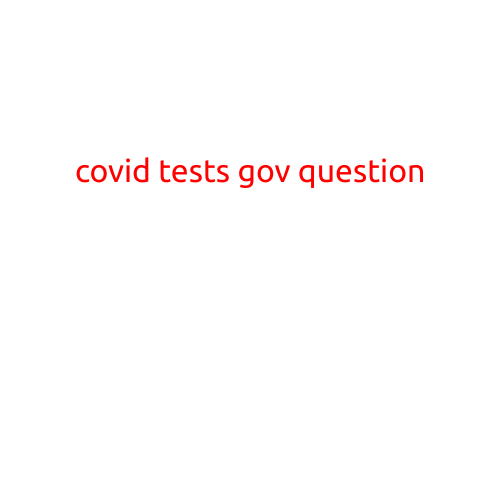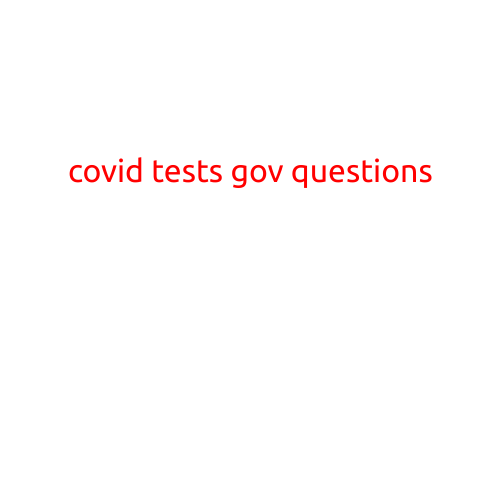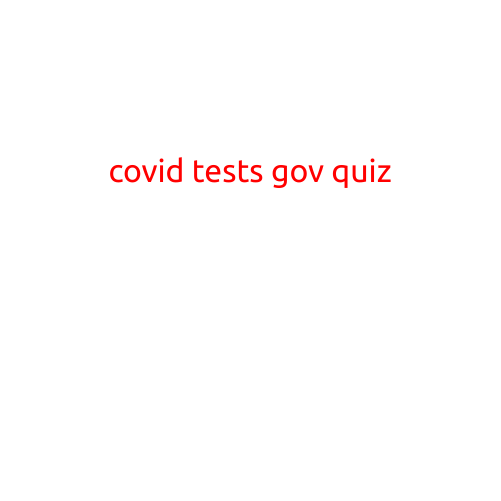
Covid Tests: Government Questions and Answers
As the world continues to grapple with the ongoing COVID-19 pandemic, one of the most common concerns for individuals and governments alike is the availability and effectiveness of COVID-19 testing. In this article, we will explore some of the most frequently asked questions about COVID-19 tests, and provide answers based on the latest government guidance and recommendations.
Q: What types of COVID-19 tests are available?
A: There are two main types of COVID-19 tests: molecular tests and antigen tests. Molecular tests, such as PCR (polymerase chain reaction) and NAAT (nucleic acid amplification), detect the genetic material of the virus. Antigen tests, on the other hand, detect specific proteins on the surface of the virus. Both types of tests can be used to diagnose COVID-19, but molecular tests are generally more accurate and sensitive.
Q: How accurate are COVID-19 tests?
A: The accuracy of COVID-19 tests can vary depending on the type of test, the quality of the test, and the patient’s medical history. Molecular tests are generally more accurate than antigen tests, with a false positive rate of around 1% and a false negative rate of around 5%. Antigen tests, on the other hand, have a higher false positive rate (around 4%) and a false negative rate (around 15%).
Q: How should COVID-19 tests be administered?
A: COVID-19 tests can be administered in various ways, including:
- Nasal swab: This is the most common method of testing, where a healthcare professional inserts a long, flexible swab into the patient’s nose to collect a sample.
- Throat swab: This method involves inserting a swab into the patient’s throat to collect a sample.
- Saliva sample: Some antigen tests can be performed using a saliva sample, which is collected by having the patient spit into a tube.
- Blood sample: Molecular tests can also be performed using a blood sample, which is collected by inserting a needle into a vein.
Q: How long does it take to get COVID-19 test results?
A: The time it takes to get COVID-19 test results can vary depending on the type of test, the laboratory processing time, and the healthcare facility’s testing protocol. Molecular tests typically take 2-5 days to produce results, while antigen tests can take anywhere from a few minutes to a few hours. Some healthcare facilities may also offer rapid testing, which can provide results in as little as 15 minutes.
Q: Are COVID-19 tests available for all individuals?
A: COVID-19 tests are generally available for individuals who meet certain criteria, such as:
- Travelers returning from high-risk areas
- Individuals with symptoms of COVID-19
- Healthcare workers and other essential personnel
- Individuals with a high risk of exposure (e.g. those who have been in close contact with someone who has tested positive for COVID-19)
Q: Is it necessary to get tested for COVID-19?
A: Getting tested for COVID-19 is not strictly necessary, but it is highly recommended for individuals who meet the criteria mentioned above. Testing can help identify individuals who are infected and prevent the spread of the virus. Additionally, COVID-19 tests can also help healthcare professionals monitor infection rates and track the effectiveness of public health measures.
Conclusion
COVID-19 tests are an important tool in the fight against the pandemic, and understanding the different types of tests, their accuracy, and how they are administered can help individuals make informed decisions about their own health and well-being. By staying informed and following government guidelines, we can all do our part to help prevent the spread of COVID-19.





